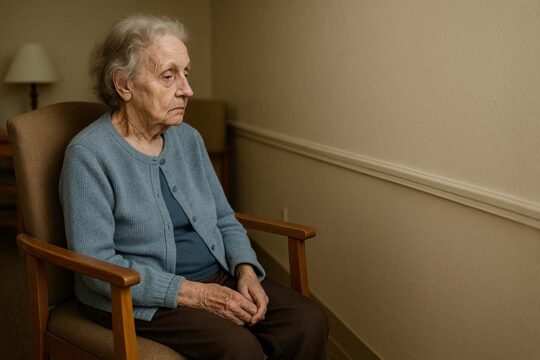
A Guide for Causes of Disorientation and Confusion in Elderly
Causes of Disorientation and Confusion in Elderly
What is disorientation?
Disorientation refers to a state of confusion or lack of awareness regarding time, place, person, or situation. It’s a common symptom experienced by older adults and can be a sign of underlying conditions, including dementia, delirium, urinary tract infections, medication side effects, or metabolic imbalances like dehydration or electrolyte disturbances. Disorientation can significantly impact an elderly person’s ability to perform daily activities safely and independently, and it may fluctuate in intensity over time. Prompt evaluation and management are essential to address the underlying cause and mitigate potential risks associated with this condition.
What causes disorientation in elderly people?
Causes of disorientation and confusion in elderly people reflect the complexity of health issues that can affect people as they age. Common causes may include:
- Dementia: Conditions like Alzheimer’s disease and other forms of dementia are characterized by cognitive decline, including memory loss and disorientation.
- Delirium: An acute, sudden change in mental status, often caused by infections, dehydration, medication side effects, or hospitalization.
- Medication Side Effects: Many medications can cause confusion or disorientation, especially if they affect the central nervous system or if multiple medications interact.
- Urinary Tract Infections (UTIs): In the elderly, UTIs can manifest with confusion and disorientation rather than the typical symptoms seen in younger individuals.
- Dehydration and Electrolyte Imbalances: Dehydration, as well as imbalances in sodium, potassium, and other electrolytes, can lead to cognitive disturbances.
- Stroke or Transient Ischemic Attack (TIA): Interruptions to blood flow in the brain can cause temporary or permanent cognitive impairments, including disorientation.
- Nutritional Deficiencies: Deficiencies in vitamins, like B12, can affect neurological function and lead to cognitive issues.
- Brain Injuries: Head injuries can cause immediate disorientation and long-term cognitive problems.
- Psychiatric Conditions: Depression, anxiety, and other mental health issues can sometimes manifest as confusion or disorientation in the elderly.
- Sleep Deprivation: Lack of sleep or disrupted sleep patterns can significantly affect cognitive function.
Given the broad range of potential causes, a comprehensive medical evaluation is important to help identify and treat the specific factors contributing to disorientation in an elderly person.
Can dehydration cause disorientation in elderly?
Dehydration can cause disorientation in the elderly. As people age, their body’s ability to conserve water decreases, and the sense of thirst may become less acute. This can easily lead to dehydration, especially if the elderly person is not consciously making an effort to drink sufficient fluids, or if they are experiencing conditions that increase fluid loss, like fever, diarrhea, or diuretic medications.
Dehydration affects the body’s electrolyte balance, which is essential for normal brain function and nerve transmission. When the brain and nerves are affected by this imbalance, it can lead to symptoms of confusion, disorientation, dizziness, and in severe cases, delirium. These cognitive symptoms can be pronounced in the elderly, making dehydration a critical issue that should be addressed promptly to prevent further complications. Regular monitoring of fluid intake and encouraging the elderly to drink water regularly can mitigate the risk of dehydration-induced disorientation.
What stage is disorientation in dementia?
Disorientation is a symptom that can occur at various stages of dementia, but it is more commonly associated with the middle to later stages of the condition. Dementia progresses in stages and the symptoms become more pronounced as it advances.
Early Stage: In the early stages of dementia, an elderly person may experience mild forgetfulness or memory lapses, including forgetting names or where they placed everyday items, but disorientation is minimal in the early stage.
Middle Stage: As dementia progresses to the middle stage, disorientation becomes more evident. Your loved one may start to lose track of time, forgetting the day of the week or date. They might also become disoriented in familiar places, having difficulty remembering how to get home or to other locations they frequently visit.
Late Stage: In the late stages of dementia, disorientation can become severe. Your loved one may not recognize familiar faces, including close family members, and may have a poor understanding of their surroundings. They can become confused about where they are, even within their own home, and may not remember parts of their life.
Progression of disorientation affects the person’s ability to navigate daily life and poses significant safety risks, requiring increased supervision and care as the disease progresses.
What is delirium in the elderly?
Delirium in the elderly is a serious and acute disturbance in mental abilities that results in confused thinking and reduced awareness of the environment. It represents a sudden change from the person’s baseline level of cognitive function. Its characterized by fluctuations in consciousness over the course of the day, difficulties with attention and concentration, disorganized thinking, and sometimes hallucinations or delusions. Unlike dementia, which is a slow, progressive decline in cognitive function, delirium develops quickly, within hours or a few days.
Delirium is usually triggered by a medical illness, infection like a urinary tract infection, medication side effects or interactions, surgery, dehydration, alcohol or drug withdrawal. It’s a medical emergency because it can indicate a life-threatening condition. The elderly are susceptible to delirium due to their reduced physiological reserve and the higher likelihood of having multiple medical conditions or being on several medications.
Management includes identifying and treating underlying causes, ensuring the safety of the person, and providing supportive care to minimize confusion and distress. It’s also important to prevent delirium in at-risk people through proper hydration, managing pain, and avoiding or closely monitoring the use of delirium-inducing medications. Recovery from delirium can vary, with some patients returning to their baseline cognitive function and others experiencing lasting cognitive impairment.
What causes sudden confusion in elderly people?
Sudden confusion in elderly people, often characterized by abrupt disorientation regarding time, place, or person, can stem from various medical conditions. This acute cognitive impairment is commonly triggered by delirium, which can be a result of infections like urinary tract infections or pneumonia, known for their propensity to cause confusion even in the absence of typical symptoms. Adverse reactions to medications or interactions are another frequent cause. Dehydration and electrolyte imbalances may disrupt brain function, leading to confusion or hypoglycemia, kidney or liver failure, or thyroid imbalances. Sudden confusion might indicate a stroke or transient ischemic attack (TIA). Head injuries, severe pain, and alcohol or drug withdrawal can precipitate confusion. Confusion in the elderly should be treated as a medical emergency, needing immediate evaluation.
When to see a doctor for disorientation and confusion in the elderly
It’s important to seek medical attention promptly when your loved one exhibits disorientation and confusion, especially if these symptoms arise suddenly or represent a significant change from their usual mental state. Here are scenarios where consulting a doctor is imperative:
Sudden Onset: If disorientation and confusion develop abruptly, it could indicate a serious underlying condition like a stroke, infection, or metabolic imbalance.
Worsening Symptoms: If an individual’s confusion or disorientation worsens or doesn’t improve, evaluation by a medical professional is necessary to determine the cause and appropriate treatment.
Accompanying Symptoms: Seek immediate medical attention if confusion and disorientation are accompanied by other symptoms like difficulty speaking, weakness on one side of the body, severe headache, high fever, difficulty breathing, chest pain, or unusual behavior.
Risk of Harm: If the disorientation or confusion puts the individual at risk of harm, like wandering off or inability to perform daily tasks safely, medical intervention is needed.
Impact on Daily Life: If the symptoms significantly impact the person’s ability to care for themselves, eat, drink, or sleep, they need medical evaluation.
No Known Cause: If there is no clear reason for the sudden change in mental state, such as recent medication changes or known illnesses, a doctor’s assessment is important to uncover any hidden health issues.
Medication: For people on medication, confusion might indicate adverse reactions or interactions between medications, requiring a doctor’s review of their prescriptions.
Prompt medical evaluation can help diagnose the cause of disorientation and confusion, allowing for timely treatment to prevent complications. It also manages the symptoms more effectively, to improve the person’s quality of life.
Related Articles
Types of Dementia and Dementia-Related Diseases
Discover the key differences between retirement homes and assisted living to help you choose the right care for your loved one’s needs.
Learn the risks of leaving a dementia patient alone, legal responsibilities, care strategies, and how to plan for their safety.
Learn why dementia patients wander at night, how to prevent it, and when memory care is the safest option for your loved one in San Diego.
Compare memory care and assisted living, from services and costs to safety and staffing, to find the right senior care in San Diego.



